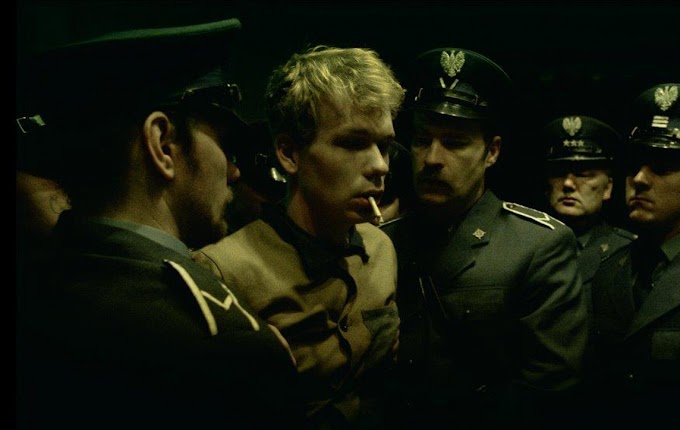A dark universe depicted by Bresson, like the black fades used during the central sequence in the forest. Time passes elliptically, but also poetically, as in the shot showing the moon piercing through darkness and haze. However, Mouchette’s story invites us to hope for more hope.

"Hope
for more hope ..." chant the schoolchildren of Mouchette in their hearts,
before the stubborn heroine is publicly reprimanded for her refusal to utter
these words (she will say them later on her own, to comfort an epileptic from
her sudden crisis). There is a dreadful irony in this refrain: Mouchette is, if
it is, a radically hopeless film about an open countryside abandoned by God,
left to the wickedness of men. From the depths of the woods, in his stubborn
refusal to play the game of social life, his constant sullen rebellion,
Mouchette announces other little punks, the no future. This rebellious figure
is for Bresson, fascinated by the teenage revolt, a chosen saint. However
precise her description of the brutality of the rural world to which she is
subjected, his film is not a naturalist treatise but a biblical allegory, where
social determinism is joined to an evil predestination of a metaphysical
nature.
One hour
seventeen in a straight line, without any frills, which sees the young girl,
forced in a dilapidated interior to take care of her sick mother and her infant
little brother, being mistreated by her comrades, the teaching staff , the
villagers, before getting lost, one stormy evening, in a forest where the
poacher Arsène (Jean-Claude Guibert), drunk and having probably just killed a
gardener, the sum to serve as his alibi before the getting drunk on juniper and
abusing it. Back in the fold, it was not long before she learned of the mother’s
death. So summarized, Mouchette is an almost grotesque atrocity. It is also a
work of great gentleness, an exercise in complete empathy, in unaltered
compassion, for a martyred figure.

Bresson adapts
Mouchette by Georges Bernanos, a writer he translates to screen for a second
time, with whom he shares a Jansenist rigor, but substituting for the
impetuosity of his language the dryness of his style. Bresson is the filmmaker
of gestures (who better than him films the hands?), Everyday objects, the
purity of the game (Nadine Nortier's face is a blank canvas on which to project
the pain of the world). His project is less akin here to that which he
entertained in Diary of a country priest than in Au hasard Balthazar: to be an
impassive witness to the violence exercised by everyday life on the most
deprived.
The film does not practice emphasis but a form of dark platitude. It takes three successive attempts at the suicidal to drown properly, the conclusion of the nightly clash between the poacher and the gamekeeper by the river is killed by an ellipse.We must beware of the sleeping water, such as the surf in the pond where the girl's body lies while the Monteverdi Magnificat resonates. A fun fair where she has fun in bumper cars brings a brief respite, which her father breaks off slapping her for having seen him approaching the one who, paradoxically, seemed the man least susceptible to predation towards her. among the bestiary presented.Keeping head above water is not exactly on the agenda of this pastoral nightmare. Bresson's intransigence has sometimes given rise to suspicion of a certain sadism. It is not this title, nor the aforementioned precedent, that could allay this concern. Here again, to describe this desperate route, the ascetic style of the director works wonders: these obtuse faces, these rare and lifeless words, these bodies dislocated by the framing and the editing, these mechanical movements excel at giving an account of a society deprived of grace, engulfed in selfishness and resentment.

Despite the
violence, very real, instead of indignation and revolt, it is a kind of despair
that emerges from the film, a despair that grows while retaining great
simplicity: nothing here, obviously , bombastic or pressured. We are on a slow
and stoic suicidal march that nothing can stop: unlike the bird at the start,
no one can save Mouchette; on the contrary, it even seems that everyone is
striving, even in the displayed generosity, to put it aside. And in the end,
for the viewer, this rich and profound experience is adorned, by the grace of
unparalleled mastery, in a manner of dark beauty that has not aged. Fifty years
later, the fate of Mouchette touches us and, beyond the character, the world in
which she lives, recorded by a fearless camera, has lost none of its brutality.

.png)

0 Comments